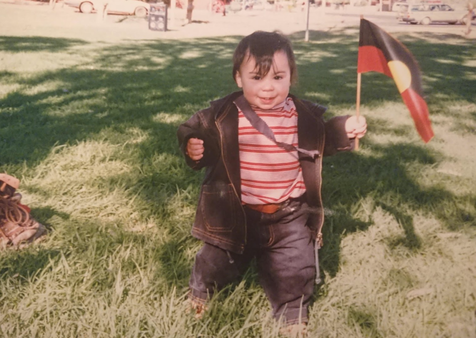|
Issue 6, Semester 1, 2019 TYSON HOLLOWAY-CLARKE When I graduated in 2017 Uncle Wayne Atkinson was on the dias. He spoke about his people, the Yorta Yorta people, his research and his life’s work in fighting for land rights and education. That day I had all my regalia on, with the unique addition of a sash. It was striped in the red, yellow and black of the Aboriginal flag. Over the many hours of ceremony I could tell Uncle Wayne was growing weary, his eyes hanging low and following the shoes across the stage. It was quite a startle for him then when my dad Gavin broke with the explicitly stated instruction “Do not to cheer for your child”. Uncle Wayne spotted my larger than life black father in the crowd and swung around. He saw my sash, shining in our colours. He looked as though he was almost as happy as my Dad. After all the formalities Uncle Wayne sought my Dad and I out amongst the masses, canapes and photo studios. Of the many thousands, there might have been one or two other Indigenous students graduating at that ceremony but we were easy to spot thanks to our sashes. I had met Uncle Wayne before and read about the Yorta Yorta Case. I had a lot of Indigenous peers that belong to the Yorta Yorta people. I had seen them all working so diligently and endlessly to restore their culture through dance, song, language and ceremony. I have even had the chance to play the yidaki for them and learn their dances. While I am not Yorta Yorta I can say I am proud of their mob for remaining strong in the face of such adversity. Getting the chance to speak with Uncle Wayne and share a moment with him on the dias is still one of my highlights of my time at University.
This week just gone was one of the hardest weeks I have had while at law school. It was Native Title week in Property. In many respects a lot of my education had been building to this. Nevertheless it was really hard. I fought back tears on more than one occasion. I felt pain, anger and sorrow for the Yorta Yorta people. There are few injustices greater in history than the treatment of the Yorta Yorta people, in both colonial times and in 1995 at the High Court of Australia. It hurt to see their survival, resistance and efforts erased by the Court but it was an all too familiar story. I think it hurt most of all because it was personal. This isn’t a case about faceless and nameless people from decades ago; these are people I know, my friends, their family and some of my role models. It hurt because I was hurting for them, but I was also hurting for myself. In April of 1929 my Grandmother Eileen, who I call Gumani, was taken from her mother Daisy by police. My Gumani was then subjected to a cruel upbringing of starvation, abuse, and isolation at the hands of missionaries at the Moore River Native Settlement, also known as Mogumber Mission. If you have seen the film Rabbit-Proof Fence you know the place. My Gumani then spent her adolescent years as a slave of various pastoralists of southern Western Australia, surviving off animal bones and table scraps. I know all this because it is a part of the fabric of our family and I put the story to paper as a part of my history thesis. By removing my Gumani from her mother, the state government of Western Australia under the orders of Auber Octavius Neville fractured our family for decades. It took until 2017 for me, my cousins, my aunties and uncles to step on our family’s country for the first time. I was on that trip to honour my Great-Grandmother and visit her newly laid headstone. For decades she had been buried in an unmarked grave. I found out while on that trip that the Njamal people, my Gumani’s people, were launching a Native Title claim. It was at that moment that I fully realised that I could never be a claimant to Native Title under the current regime. By removing my Gumani from her mother and her country, my branch of our family lost our continuous connection to our language, our culture and our land. As long as the Yorta Yorta case stands my family and I are not to be recognised even if we rebuild our peoples. I know there are alternatives and that the Yorta Yorta have had some of their interests in the land satisfied. It does not abate the offense nor does it soothe the pain. Seemingly the evils of the past have not been laid to rest, but have been stirred alive again and again by the likes of Howard and the High Court. These wounds have not been closed for centuries now. Whether you are Njamal, Yorta Yorta, or otherwise, you can plainly see that justice has not been delivered and the suffering survives. My sincere hope is that our generation are the ones to bring truth, justice and healing. I want us to outlive our hurt and become whole again. I hope this for the sake of our ancestors and to build a future for our descendants. Tyson is a Second Year JD Student. Other articles in this issue:
Daniel BS
9/4/2019 07:46:07 pm
This is a beautiful piece, Tyson. Hearing Uncle Wayne talk about the Yorta Yorta Case in undergrad was emotional, but seeing it reduced to the technicalities of legalese was deeply distressing. It was nothing less than the sponsorship of genocide. It's essential to put a face (or a people) to these injustices, so thank you.
Gb
10/4/2019 06:19:14 am
I always love your pieces tyson. Comments are closed.
|
Archives
October 2022
|



